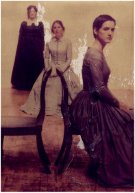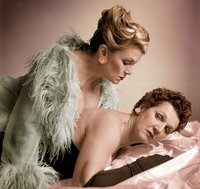Theatre about Women, by Women, for Women

Last week was a good week for me and theatre. Or maybe it was just a good week for theatre and I was lucky enough to catch some of it. Or maybe it's always good out there, but I don't usually notice. Anyway, in the space of a weekend I caught the last night of Shared Experience (left) doing "Brontë" and of Split Britches doing "Dress Suits to Hire" and they were both great.
Saturday night was the Lyric Hammersmith for a version of the Brontë story, written and directed by Polly Teale and using hauntingly dark images from Paula Rego. It opened with the three main actresses donning their 19th century costumes as they explained just how much is and isn't known about the women on whom the piece is based ...fine framing for exploring the fictionalisation of real people. Charlotte left a diary and perhaps this is why she is best fleshed out; perhaps also her relative longevity (she lasted into her 30s and saw off all three siblings - though dying before her father) and the quality of internal conflicts - between properness and the passions that seemed to have run closer to the surface for Branwell and Emily, between a desire for a place in posterity and a normal family life, and so on - contributed to making her the most interesting character. And she describes herself as exceptionally plain: the actress did her best.
Branwell is tiresome; as ill-disciplined as the others are applied in their own ways. The adored one and the great hope for the family, he is the constant disappointment to all. As a whole, the story is a comment on ambition, competition, families and particularly the constraints that women were - and still are, to some extent - operating within. But, I reflected, life has got so much better. As Charlotte dies in childbirth, another voice on stage comments that her complaint of acute morning sickness would be treated easily now. (And, as usual, I was sitting there being grateful for central heating.)
The other thing that struck me were the narrow environs of their world - stressed in the text - and how much they made of what they did experience. Ann asks to revisit the sea when she is dying; she's seen it when she had to take a job as governess and it makes an overwhelming impression. Charlotte talks of her tongue-tied bewilderment in the parties of London when she is starting to make a name for herself. Emily never leaves the parsonage except for an ill-fated few months at boarding school. Boredom, routine and closeness seem to have led to a fantastic mix of observation and imagination. I, rushing from one experience to another, hardly have time to think my thoughts, let alone record them or allow them to mellow into something more interesting. (Which is not to say that I could write something with the structural and romantic genius of "Wuthering Heights", only to say that even if I could, I'd probably never find out...)
 "Dress Suits to Hire" was delightful in a totally different way. Written by Holly Hughes with the two actresses who created the roles in 1984, it was performed by Lois Weaver and Peggy Shaw (left) again now as part of celebrating 25 years of their company. I saw it at the Drill Hall on the Sunday afternoon. It was noticeably well attended and well enjoyed by women. And, I guess, that is as it should be. The piece is a celebration of lesbian love that goes from surreal to stand-up to night club and back and it's very funny. I may have missed some of the jokes. There were things so heartily roared over in the central column of seating that it was possible to feel that that section of the audience was part of the show from my seat at the side. But with lines like: 'Someone could have an accident and lose a finger in there. ...And it won't be mine.'? It was a very wicked and flirtatious performance. (Men, you missed a great show, but perhaps that is as it should be.)
"Dress Suits to Hire" was delightful in a totally different way. Written by Holly Hughes with the two actresses who created the roles in 1984, it was performed by Lois Weaver and Peggy Shaw (left) again now as part of celebrating 25 years of their company. I saw it at the Drill Hall on the Sunday afternoon. It was noticeably well attended and well enjoyed by women. And, I guess, that is as it should be. The piece is a celebration of lesbian love that goes from surreal to stand-up to night club and back and it's very funny. I may have missed some of the jokes. There were things so heartily roared over in the central column of seating that it was possible to feel that that section of the audience was part of the show from my seat at the side. But with lines like: 'Someone could have an accident and lose a finger in there. ...And it won't be mine.'? It was a very wicked and flirtatious performance. (Men, you missed a great show, but perhaps that is as it should be.)Structurally, the story is circular. We learn more about the two characters as time passes and we enjoy their games, but both style and form celebrate the locked-in quality of the lovers in the hire agency. Even the bored narration of one character: 'Suddenly a naked light bulb swings into the room.' (and it does) seems unsurprising in a world they define as madly as they choose. This the company's words on it:
A heady mixture of erotic fantasy and hard-boiled pulp drama, two "sisters" who live in a rental clothing shop use the merchandise to try on various facets of their personalities.It is the opposite of the Brontës' reality in so many ways, though sharing themes: a comedy about passion and sexuality rather than a tragedy; a small world chosen to look in upon rather than a confined existence endlessly looking out. A wonderful point to arrive at. It brought out the woman-in-the-ostrich-feather-negligee in me that I didn't know I possessed.

0 Comments:
Post a Comment
<< Home